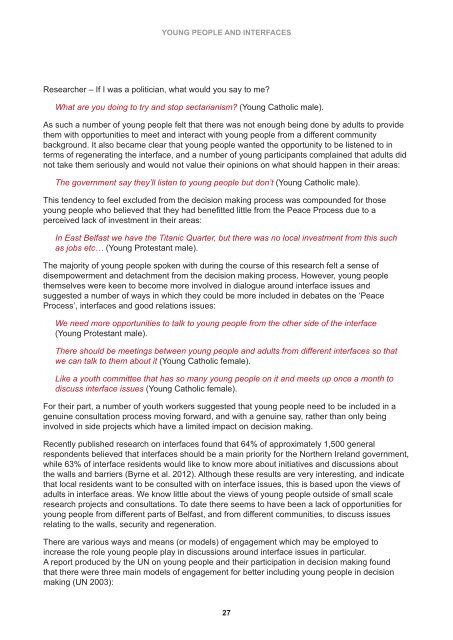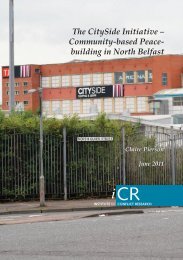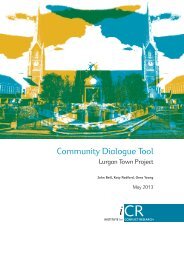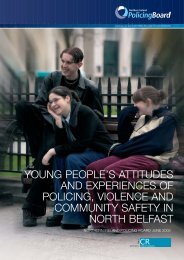Young People and Interfaces Report - Institute for Conflict Research
Young People and Interfaces Report - Institute for Conflict Research
Young People and Interfaces Report - Institute for Conflict Research
You also want an ePaper? Increase the reach of your titles
YUMPU automatically turns print PDFs into web optimized ePapers that Google loves.
YOUNG PEOPLE AND INTERFACES<br />
<strong>Research</strong>er – If I was a politician, what would you say to me?<br />
What are you doing to try <strong>and</strong> stop sectarianism? (<strong>Young</strong> Catholic male).<br />
As such a number of young people felt that there was not enough being done by adults to provide<br />
them with opportunities to meet <strong>and</strong> interact with young people from a different community<br />
background. It also became clear that young people wanted the opportunity to be listened to in<br />
terms of regenerating the interface, <strong>and</strong> a number of young participants complained that adults did<br />
not take them seriously <strong>and</strong> would not value their opinions on what should happen in their areas:<br />
The government say they’ll listen to young people but don’t (<strong>Young</strong> Catholic male).<br />
This tendency to feel excluded from the decision making process was compounded <strong>for</strong> those<br />
young people who believed that they had benefitted little from the Peace Process due to a<br />
perceived lack of investment in their areas:<br />
In East Belfast we have the Titanic Quarter, but there was no local investment from this such<br />
as jobs etc… (<strong>Young</strong> Protestant male).<br />
The majority of young people spoken with during the course of this research felt a sense of<br />
disempowerment <strong>and</strong> detachment from the decision making process. However, young people<br />
themselves were keen to become more involved in dialogue around interface issues <strong>and</strong><br />
suggested a number of ways in which they could be more included in debates on the ‘Peace<br />
Process’, interfaces <strong>and</strong> good relations issues:<br />
We need more opportunities to talk to young people from the other side of the interface<br />
(<strong>Young</strong> Protestant male).<br />
There should be meetings between young people <strong>and</strong> adults from different interfaces so that<br />
we can talk to them about it (<strong>Young</strong> Catholic female).<br />
Like a youth committee that has so many young people on it <strong>and</strong> meets up once a month to<br />
discuss interface issues (<strong>Young</strong> Catholic female).<br />
For their part, a number of youth workers suggested that young people need to be included in a<br />
genuine consultation process moving <strong>for</strong>ward, <strong>and</strong> with a genuine say, rather than only being<br />
involved in side projects which have a limited impact on decision making.<br />
Recently published research on interfaces found that 64% of approximately 1,500 general<br />
respondents believed that interfaces should be a main priority <strong>for</strong> the Northern Irel<strong>and</strong> government,<br />
while 63% of interface residents would like to know more about initiatives <strong>and</strong> discussions about<br />
the walls <strong>and</strong> barriers (Byrne et al. 2012). Although these results are very interesting, <strong>and</strong> indicate<br />
that local residents want to be consulted with on interface issues, this is based upon the views of<br />
adults in interface areas. We know little about the views of young people outside of small scale<br />
research projects <strong>and</strong> consultations. To date there seems to have been a lack of opportunities <strong>for</strong><br />
young people from different parts of Belfast, <strong>and</strong> from different communities, to discuss issues<br />
relating to the walls, security <strong>and</strong> regeneration.<br />
There are various ways <strong>and</strong> means (or models) of engagement which may be employed to<br />
increase the role young people play in discussions around interface issues in particular.<br />
A report produced by the UN on young people <strong>and</strong> their participation in decision making found<br />
that there were three main models of engagement <strong>for</strong> better including young people in decision<br />
making (UN 2003):<br />
27






